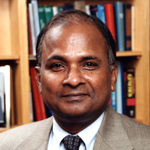Washington University School of Medicine in St. Louis is launching a new master of science degree in biostatistics.
Tailored to students with undergraduate degrees or higher in mathematics, statistics, biomedical engineering or other quantitative sciences, it is the university’s first program dedicated to training in biostatistics.
“Biostatistics training has not been keeping up with demand,” says D.C. Rao, PhD, professor of biostatistics and director of the Division of Biostatistics at the School of Medicine.

Rao
The 18-month, 44-credit program offers two pathways. The biostatistics pathway allows students to delve deeper into biostatistical methods such as survival analysis and the design of randomized controlled trials.
The statistical genetics pathway focuses on population genetics, computational statistical genetics and other disciplines specific to analyzing genomic data.
The choice of electives determines which pathway a student takes.
Rao says the program will offer comprehensive biostatistics and statistical genetics training that includes methods to make sense of vast quantities of information, from cancer clinical trials data to genomic data on complex diseases.
“Leading research centers such as the Institute for Clinical and Translational Sciences, the Siteman Cancer Center, the Alzheimer’s Disease Research Center and the Genome Center all need biostatistics and statistical genetics for a wide range of activities from study design to data analyses,” Rao says. “This program will help provide a steady stream of biostatisticians well-trained in these areas to the university’s own scientists.
“Biostatistics is a discipline that thrives when we work with clinical scientists,” Rao says.
To give students real-life experience and benefit the university’s researchers, the program’s students will complete internships and act as consultants to university investigators. Rao calls it “test-driving” a job.
“Students will spend three months working full time in a principal investigator’s lab,” Rao says. “A committee will pair students with different PIs.”
The biostatistics consulting lab allows students to work with a number of researchers in the second fall semester, offering advice on study design or solving other statistical problems.
For students interested in mentored research, the program also offers a thesis option.
Upon earning their degrees, Rao says students should have numerous job prospects, filling a need for biostatisticians in industry, in academia and in government agencies such as the Centers for Disease Control and Prevention and the National Institutes of Health.
The program is now accepting applications and has rolling admissions through May 1. The first classes begin in July.
For more information about the program and application process, visit www.biostat.wustl.edu/msibs.